IDEA 1100 S50: Critical Reflection on Writings about Indigenous Issues
VerifiedAdded on 2019/09/23
|6
|1078
|154
Report
AI Summary
This report critically reflects on writings by Manuel and Derrickson, the Truth and Reconciliation Commission, Monchalin, and Justice, examining the complexities of Indigenous perspectives, colonialism, and reconciliation in Canada. The analysis covers "The Reconciliation Manifesto," which challenges non-Indigenous Canadians to establish healthy relationships with Indigenous peoples and addresses governmental reconciliation efforts. It also explores "The Colonial Problem," highlighting the injustices faced by Indigenous communities and their perspectives on crime. Furthermore, the report delves into Linker's "Intellectual Empathy," discussing its application to social justice, critical thinking, and the intersectionality of identity, emphasizing the importance of understanding privilege, cooperative reasoning, conditional trust, and mutual vulnerability. The assignment aims to provide a clear vision of the issues and potential solutions concerning reconciliation, drawing on government reports and case studies to offer a comprehensive understanding of the challenges and opportunities in fostering a more equitable society.
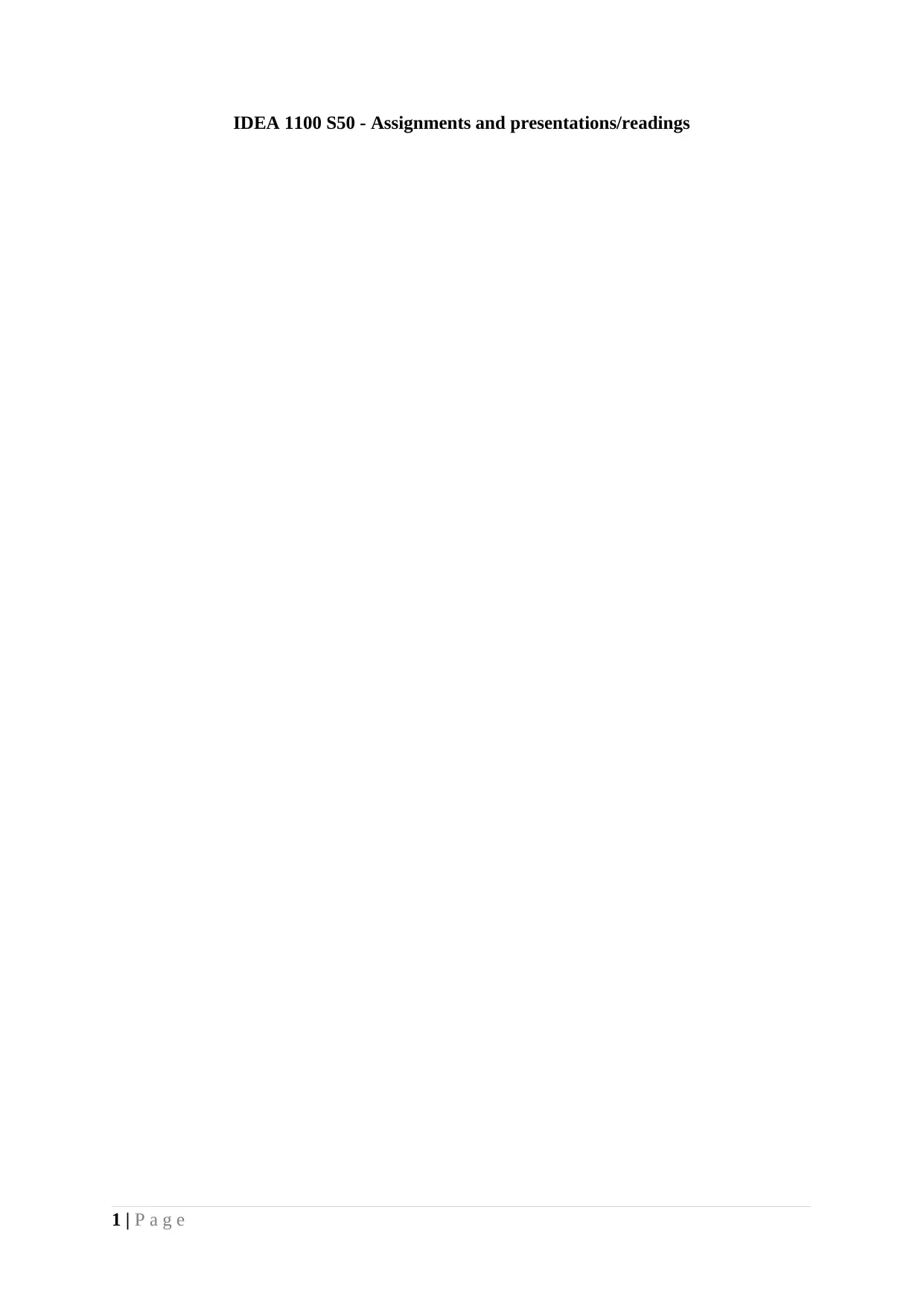
IDEA 1100 S50 - Assignments and presentations/readings
1 | P a g e
1 | P a g e
Paraphrase This Document
Need a fresh take? Get an instant paraphrase of this document with our AI Paraphraser
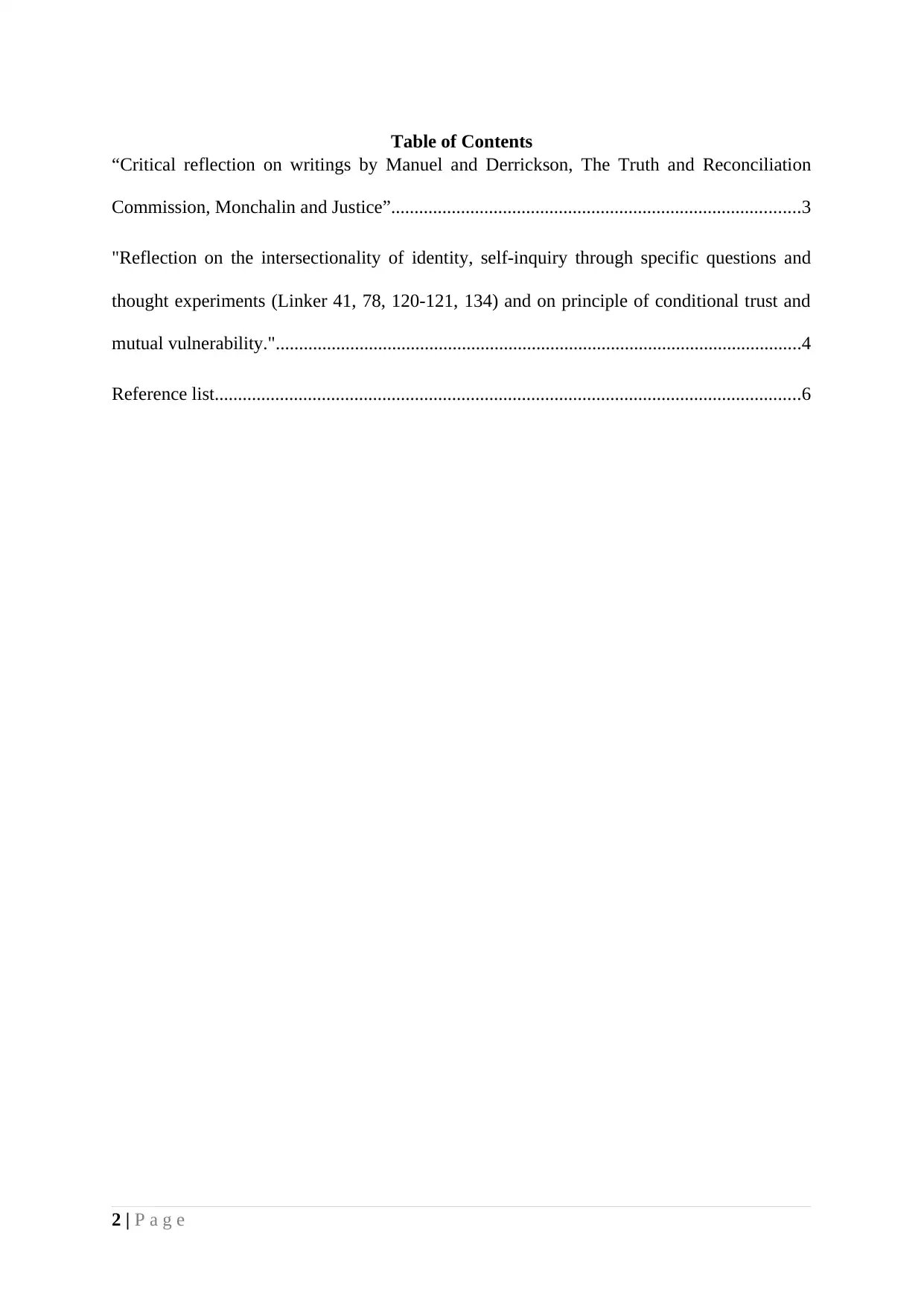
Table of Contents
“Critical reflection on writings by Manuel and Derrickson, The Truth and Reconciliation
Commission, Monchalin and Justice”........................................................................................3
"Reflection on the intersectionality of identity, self-inquiry through specific questions and
thought experiments (Linker 41, 78, 120-121, 134) and on principle of conditional trust and
mutual vulnerability.".................................................................................................................4
Reference list..............................................................................................................................6
2 | P a g e
“Critical reflection on writings by Manuel and Derrickson, The Truth and Reconciliation
Commission, Monchalin and Justice”........................................................................................3
"Reflection on the intersectionality of identity, self-inquiry through specific questions and
thought experiments (Linker 41, 78, 120-121, 134) and on principle of conditional trust and
mutual vulnerability.".................................................................................................................4
Reference list..............................................................................................................................6
2 | P a g e
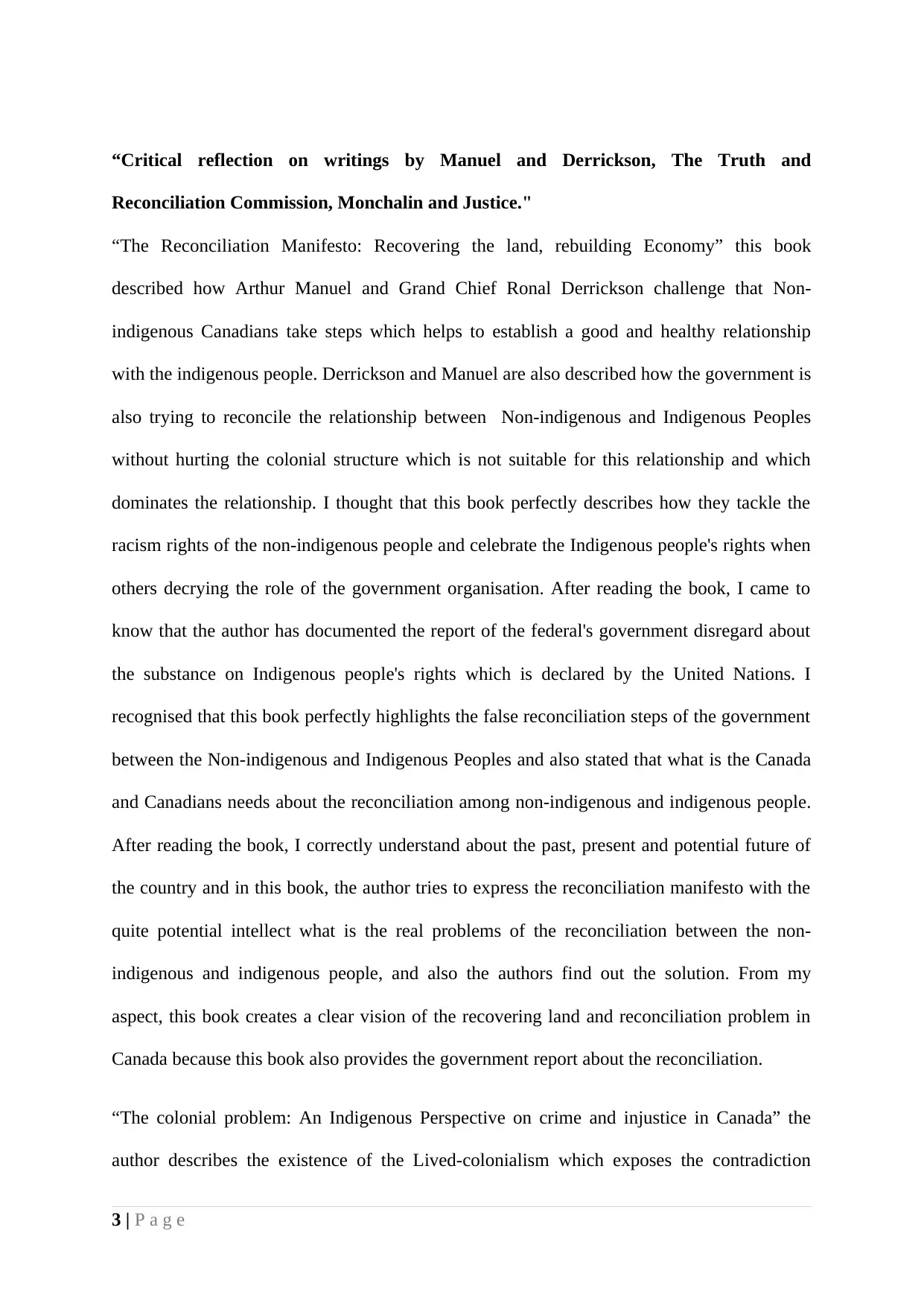
“Critical reflection on writings by Manuel and Derrickson, The Truth and
Reconciliation Commission, Monchalin and Justice."
“The Reconciliation Manifesto: Recovering the land, rebuilding Economy” this book
described how Arthur Manuel and Grand Chief Ronal Derrickson challenge that Non-
indigenous Canadians take steps which helps to establish a good and healthy relationship
with the indigenous people. Derrickson and Manuel are also described how the government is
also trying to reconcile the relationship between Non-indigenous and Indigenous Peoples
without hurting the colonial structure which is not suitable for this relationship and which
dominates the relationship. I thought that this book perfectly describes how they tackle the
racism rights of the non-indigenous people and celebrate the Indigenous people's rights when
others decrying the role of the government organisation. After reading the book, I came to
know that the author has documented the report of the federal's government disregard about
the substance on Indigenous people's rights which is declared by the United Nations. I
recognised that this book perfectly highlights the false reconciliation steps of the government
between the Non-indigenous and Indigenous Peoples and also stated that what is the Canada
and Canadians needs about the reconciliation among non-indigenous and indigenous people.
After reading the book, I correctly understand about the past, present and potential future of
the country and in this book, the author tries to express the reconciliation manifesto with the
quite potential intellect what is the real problems of the reconciliation between the non-
indigenous and indigenous people, and also the authors find out the solution. From my
aspect, this book creates a clear vision of the recovering land and reconciliation problem in
Canada because this book also provides the government report about the reconciliation.
“The colonial problem: An Indigenous Perspective on crime and injustice in Canada” the
author describes the existence of the Lived-colonialism which exposes the contradiction
3 | P a g e
Reconciliation Commission, Monchalin and Justice."
“The Reconciliation Manifesto: Recovering the land, rebuilding Economy” this book
described how Arthur Manuel and Grand Chief Ronal Derrickson challenge that Non-
indigenous Canadians take steps which helps to establish a good and healthy relationship
with the indigenous people. Derrickson and Manuel are also described how the government is
also trying to reconcile the relationship between Non-indigenous and Indigenous Peoples
without hurting the colonial structure which is not suitable for this relationship and which
dominates the relationship. I thought that this book perfectly describes how they tackle the
racism rights of the non-indigenous people and celebrate the Indigenous people's rights when
others decrying the role of the government organisation. After reading the book, I came to
know that the author has documented the report of the federal's government disregard about
the substance on Indigenous people's rights which is declared by the United Nations. I
recognised that this book perfectly highlights the false reconciliation steps of the government
between the Non-indigenous and Indigenous Peoples and also stated that what is the Canada
and Canadians needs about the reconciliation among non-indigenous and indigenous people.
After reading the book, I correctly understand about the past, present and potential future of
the country and in this book, the author tries to express the reconciliation manifesto with the
quite potential intellect what is the real problems of the reconciliation between the non-
indigenous and indigenous people, and also the authors find out the solution. From my
aspect, this book creates a clear vision of the recovering land and reconciliation problem in
Canada because this book also provides the government report about the reconciliation.
“The colonial problem: An Indigenous Perspective on crime and injustice in Canada” the
author describes the existence of the Lived-colonialism which exposes the contradiction
3 | P a g e
⊘ This is a preview!⊘
Do you want full access?
Subscribe today to unlock all pages.

Trusted by 1+ million students worldwide
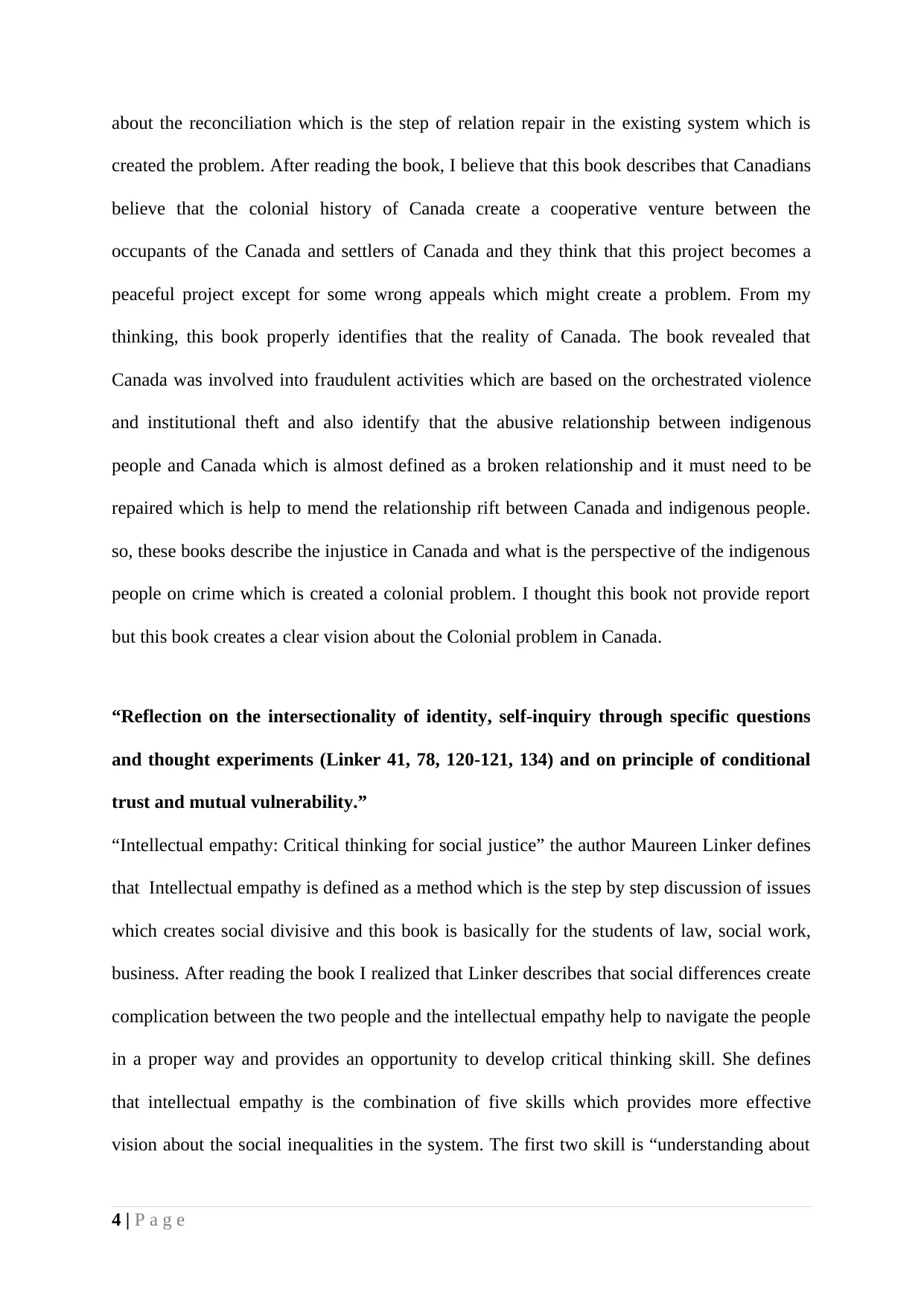
about the reconciliation which is the step of relation repair in the existing system which is
created the problem. After reading the book, I believe that this book describes that Canadians
believe that the colonial history of Canada create a cooperative venture between the
occupants of the Canada and settlers of Canada and they think that this project becomes a
peaceful project except for some wrong appeals which might create a problem. From my
thinking, this book properly identifies that the reality of Canada. The book revealed that
Canada was involved into fraudulent activities which are based on the orchestrated violence
and institutional theft and also identify that the abusive relationship between indigenous
people and Canada which is almost defined as a broken relationship and it must need to be
repaired which is help to mend the relationship rift between Canada and indigenous people.
so, these books describe the injustice in Canada and what is the perspective of the indigenous
people on crime which is created a colonial problem. I thought this book not provide report
but this book creates a clear vision about the Colonial problem in Canada.
“Reflection on the intersectionality of identity, self-inquiry through specific questions
and thought experiments (Linker 41, 78, 120-121, 134) and on principle of conditional
trust and mutual vulnerability.”
“Intellectual empathy: Critical thinking for social justice” the author Maureen Linker defines
that Intellectual empathy is defined as a method which is the step by step discussion of issues
which creates social divisive and this book is basically for the students of law, social work,
business. After reading the book I realized that Linker describes that social differences create
complication between the two people and the intellectual empathy help to navigate the people
in a proper way and provides an opportunity to develop critical thinking skill. She defines
that intellectual empathy is the combination of five skills which provides more effective
vision about the social inequalities in the system. The first two skill is “understanding about
4 | P a g e
created the problem. After reading the book, I believe that this book describes that Canadians
believe that the colonial history of Canada create a cooperative venture between the
occupants of the Canada and settlers of Canada and they think that this project becomes a
peaceful project except for some wrong appeals which might create a problem. From my
thinking, this book properly identifies that the reality of Canada. The book revealed that
Canada was involved into fraudulent activities which are based on the orchestrated violence
and institutional theft and also identify that the abusive relationship between indigenous
people and Canada which is almost defined as a broken relationship and it must need to be
repaired which is help to mend the relationship rift between Canada and indigenous people.
so, these books describe the injustice in Canada and what is the perspective of the indigenous
people on crime which is created a colonial problem. I thought this book not provide report
but this book creates a clear vision about the Colonial problem in Canada.
“Reflection on the intersectionality of identity, self-inquiry through specific questions
and thought experiments (Linker 41, 78, 120-121, 134) and on principle of conditional
trust and mutual vulnerability.”
“Intellectual empathy: Critical thinking for social justice” the author Maureen Linker defines
that Intellectual empathy is defined as a method which is the step by step discussion of issues
which creates social divisive and this book is basically for the students of law, social work,
business. After reading the book I realized that Linker describes that social differences create
complication between the two people and the intellectual empathy help to navigate the people
in a proper way and provides an opportunity to develop critical thinking skill. She defines
that intellectual empathy is the combination of five skills which provides more effective
vision about the social inequalities in the system. The first two skill is “understanding about
4 | P a g e
Paraphrase This Document
Need a fresh take? Get an instant paraphrase of this document with our AI Paraphraser
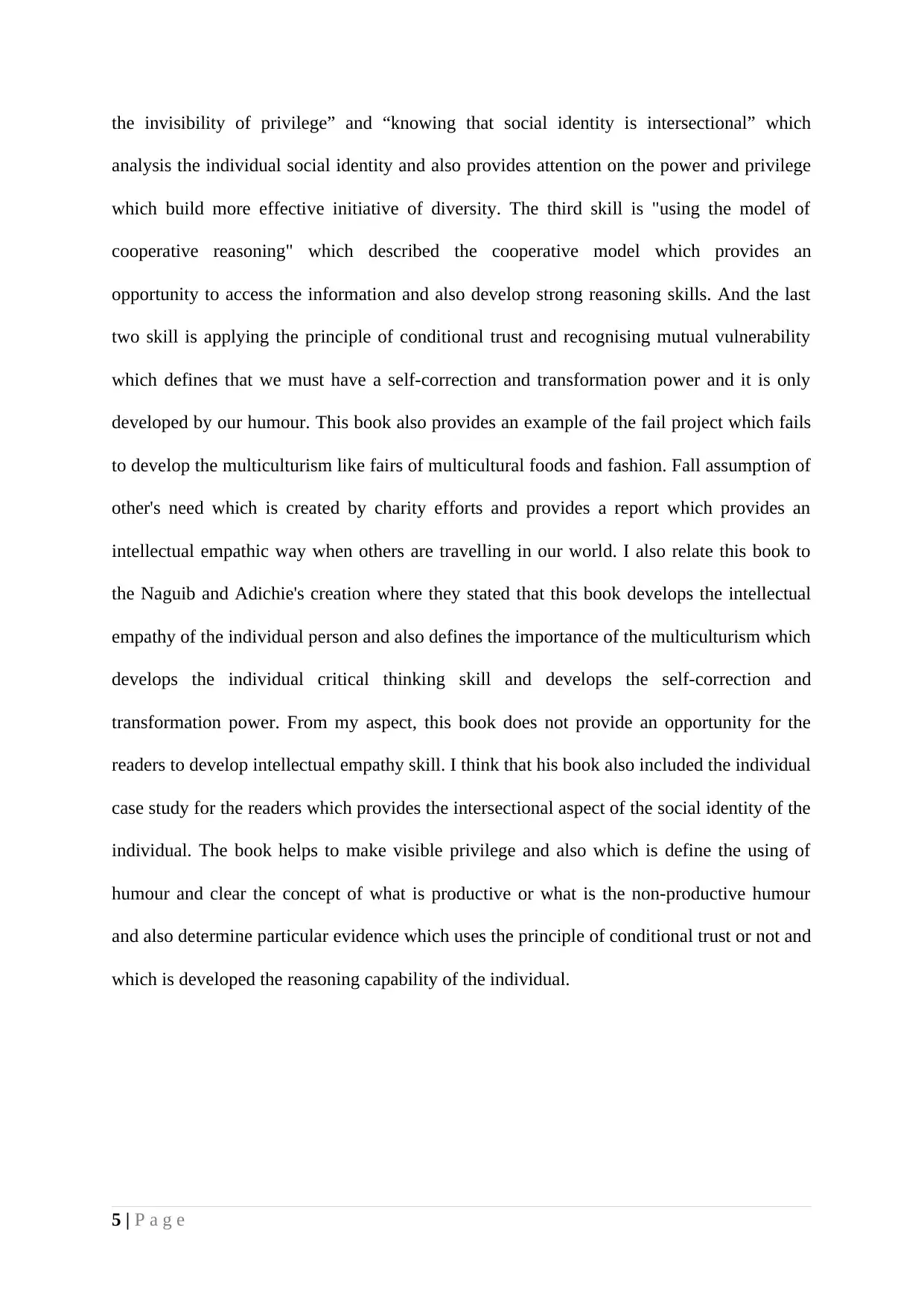
the invisibility of privilege” and “knowing that social identity is intersectional” which
analysis the individual social identity and also provides attention on the power and privilege
which build more effective initiative of diversity. The third skill is "using the model of
cooperative reasoning" which described the cooperative model which provides an
opportunity to access the information and also develop strong reasoning skills. And the last
two skill is applying the principle of conditional trust and recognising mutual vulnerability
which defines that we must have a self-correction and transformation power and it is only
developed by our humour. This book also provides an example of the fail project which fails
to develop the multiculturism like fairs of multicultural foods and fashion. Fall assumption of
other's need which is created by charity efforts and provides a report which provides an
intellectual empathic way when others are travelling in our world. I also relate this book to
the Naguib and Adichie's creation where they stated that this book develops the intellectual
empathy of the individual person and also defines the importance of the multiculturism which
develops the individual critical thinking skill and develops the self-correction and
transformation power. From my aspect, this book does not provide an opportunity for the
readers to develop intellectual empathy skill. I think that his book also included the individual
case study for the readers which provides the intersectional aspect of the social identity of the
individual. The book helps to make visible privilege and also which is define the using of
humour and clear the concept of what is productive or what is the non-productive humour
and also determine particular evidence which uses the principle of conditional trust or not and
which is developed the reasoning capability of the individual.
5 | P a g e
analysis the individual social identity and also provides attention on the power and privilege
which build more effective initiative of diversity. The third skill is "using the model of
cooperative reasoning" which described the cooperative model which provides an
opportunity to access the information and also develop strong reasoning skills. And the last
two skill is applying the principle of conditional trust and recognising mutual vulnerability
which defines that we must have a self-correction and transformation power and it is only
developed by our humour. This book also provides an example of the fail project which fails
to develop the multiculturism like fairs of multicultural foods and fashion. Fall assumption of
other's need which is created by charity efforts and provides a report which provides an
intellectual empathic way when others are travelling in our world. I also relate this book to
the Naguib and Adichie's creation where they stated that this book develops the intellectual
empathy of the individual person and also defines the importance of the multiculturism which
develops the individual critical thinking skill and develops the self-correction and
transformation power. From my aspect, this book does not provide an opportunity for the
readers to develop intellectual empathy skill. I think that his book also included the individual
case study for the readers which provides the intersectional aspect of the social identity of the
individual. The book helps to make visible privilege and also which is define the using of
humour and clear the concept of what is productive or what is the non-productive humour
and also determine particular evidence which uses the principle of conditional trust or not and
which is developed the reasoning capability of the individual.
5 | P a g e

Reference list
6 | P a g e
6 | P a g e
⊘ This is a preview!⊘
Do you want full access?
Subscribe today to unlock all pages.

Trusted by 1+ million students worldwide
1 out of 6
Related Documents
Your All-in-One AI-Powered Toolkit for Academic Success.
+13062052269
info@desklib.com
Available 24*7 on WhatsApp / Email
![[object Object]](/_next/static/media/star-bottom.7253800d.svg)
Unlock your academic potential
Copyright © 2020–2026 A2Z Services. All Rights Reserved. Developed and managed by ZUCOL.





